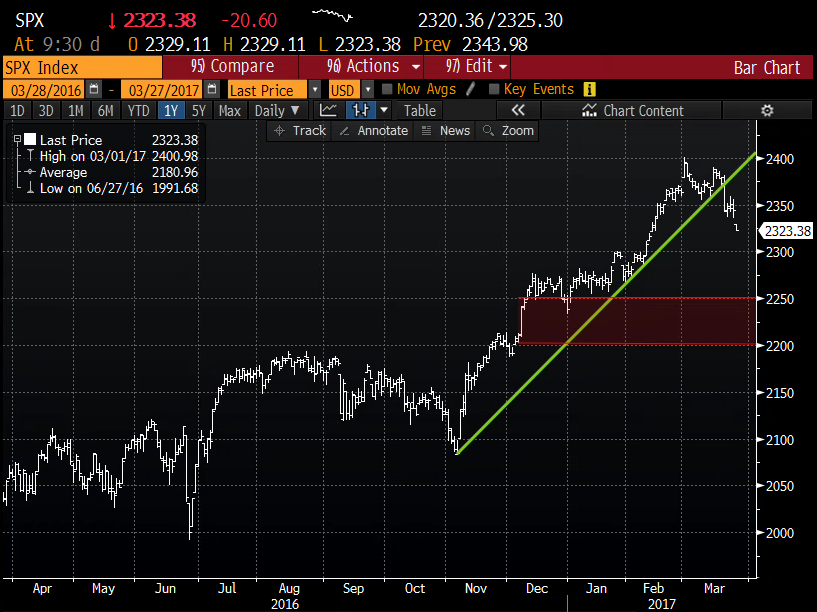For the last couple months In my Monday morning post I have included the implied weekly movement for the etf that tracks the S&P 500, the SPY. For every week in February and March, the implied weekly movement has been less than 1% in either direction. That was towards the tail end of a streak of more than 100 days without a 1% decline. That streak ended last Tuesday as investors started to question the new administration’s ability to get through much of its proposed (and perceived) pro-growth/pro-business agenda.
On Thursday we made the case that if investors lose faith in that pro growth agenda then we could see a move back into U.S. Treasuries after such a sharp decline from the 52-week and all-time highs made last June following Brexit (read here). And on Friday we updated our bearish thesis on the S&P 500 (SPX) from mid-February, detailing a roll out from May to June to our earlier trade idea targeting a retracement to a good part of the post-election rally (read here).
Taking a quick look at the SPX, while last Tuesday’s decline not only broke a streak, it also broke the uptrend from the pre-election lows. To my eye, the next stop is down toward support near the December breakout between 2200 and 2250:

I’m not suggesting it gets to that range in a straight line, but I suspect we see 2250 before we see 2400 again. In the next month we will get to the end of the the fairly random “first 100 days” honeymooon period and at that point if we’re not seeing concrete steps taken towards a pro growth agenda, I suspect market participants may shift from glass half full to half empty. That means greater volatility. The timing will also coincide with the French elections and then in not too long a time, the German elections, all with implications for the global economy. Rallies may present good opportunities to reduce portfolio risk and maybe even good short opportunities for traders. I am not sure sudden declines are great buying opportunities until we get a good old fashioned protracted sell-off and get rid of some of the market excesses of the past few months.
Bottom line, in the coming weeks Q1 earnings season will start, and the failure of congress to repeal the ACA all but ends the assumptions the market was making on tax reform, and fiscal stimulus. It also adds a level of uncertainty. That will be reflected in forward guidance of the companies due to report. There is very little reason for corporates’ to stick their neck out while stocks are still very near all time highs.